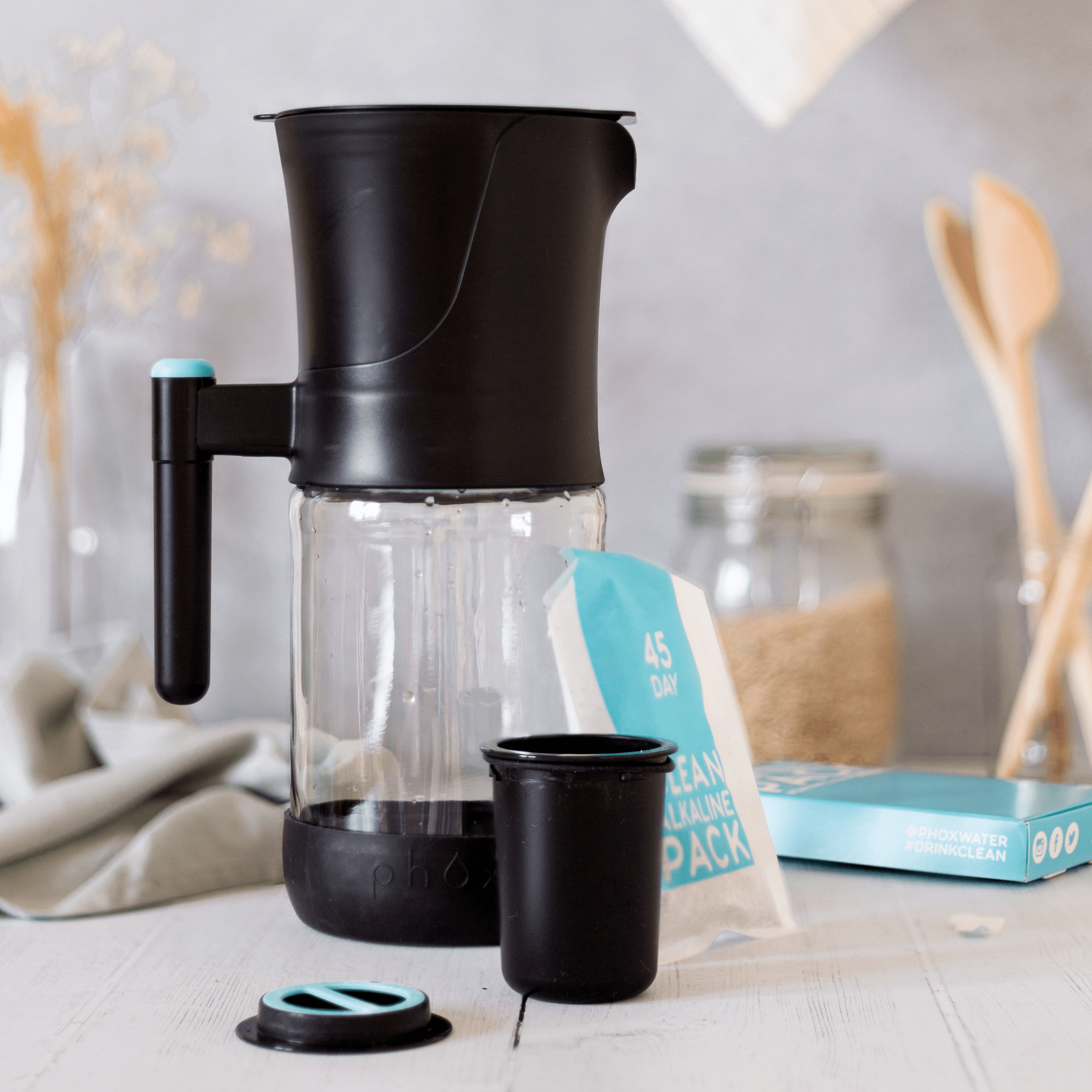Everything You've Ever Wanted to Know About Our Filter
The production of our filters is a bit of a complicated process. We found it too generic to make one filtration formula for everyone. Thats why we currently stock our alkaline and clean pack.
So it's natural for our customers to have lots of questions about the process. Not just health-wise, but finding our why we do (and don't do) some things, plus digging deep to comprehensively work out which of our refill packs is best for you.
And why wouldn't you, right? Makes sense to want to know as much as you can about the company and product you're switching to.
Below, we're going to look at (hopefully) everything you've wanted to know about our filters. Let this be your Phox handbook, to help you become an expert in everything we do. It's all for your benefit, after all.
The Basics
Not to toot our own horn, but we do things a little differently. For one, when you switch to Phox, you have a choice of refill packs, the clean and alkaline. A non-negotiable for us was making sure both our packs were sustainable and removed contaminants from your water.
Our clean pack is designed to soften water in hard water areas (see our map below to work out if this might be you) and our alkaline pack adds sodium and magnesium. The purpose of this is to help aid sports recovery, but was first suggested due to it's known benefits as an effective remedy against acid reflux and heartburn.

Where it gets a teeny bit more complicated
Most water filters use ion exchange resin, its function is to swap out calcium and magnesium (a key cause of hardness and limescale). The resin exchanges either hydrogen or sodium ions for calcium/magnesium ions. So the end result is water with much lower levels of calcium and magnesium but higher levels of hydrogen.
Some filters use softening resin which would exchange sodium into water, alongside hydrogen. What's important to know is, our filters swap calcium and magnesium for sodium/hydrogen, sodium being another important alkaline mineral, not to be confused with sodium chloride (table salt). We then add the magnesium back in, so you're not missing out.

Why is it important for these things to be in our water?
Calcium and magnesium are important minerals to consume, with around 70% of people in the U.K having low magnesium levels. Having said that, we aren't suggesting hard water is the only way to consume water for it to be beneficial. Soft water is also healthy to drink, but what we looked at as a starting point was the function of certain filters. Some people would prefer not to remove calcium and magnesium from their water, full stop.
In a nutshell, many water filters are designed to remove beneficial materials from our water at the same time as removing the non-beneficial ones.
How do Brita jugs make water more acidic? Is it necessarily a bad thing?
Similar to a point a little earlier on, their process in simple terms utilises the ion exchange process, removing calcium and magnesium and swapping for hydrogen ions, which make water more acidic. Increased acidity can make the water taste slightly bitter, for several reasons. But, some people are sensitive to acidic food and drink; it can lead to acid reflux symptoms, which is another reason why we were so keen to include an alkaline pack.
A study by Kaufman and Johnson (2012) found that alkaline water inactivated human pepsin due to its acid-buffering capacity. And it comes back to us making sure we don't just remove everything, good and bad in your water.
"I'm still struggling to work out the difference. Does the clean pack have fewer beneficial materials added?"
Yes, but as we say, it doesn't mean soft water is necessarily less beneficial. The clean pack is there to remove hardness, built for hard water areas and customers who would like to decrease scale. Therefore, it is lower calcium and magnesium. Quite often we find if customers still have an issue with scaling, we swap them to the clean pack with great results.
And we quite often, and rightly so, have people asking "I live in a hard water area, but still suffer from acid reflux. Can I still use the alkaline pack?" In short, yes.
The alkaline pack does have softening element to it but will add minerals which is the primary cause of limescale. It can still be used but may not aid limescale issues as well in your appliances compared to the clean pack.
We've tested against some key aspects of hard water areas and hard metals that are so prominent in tap water, particularly in areas with chalky, hard water. We are currently working on new solutions to make out filters even more effective.

Why not just get a Reverse Osmosis system then?
Well, firstly because it's a bigger and considerably more expensive piece of equipment than a filter jug (try fitting an RO system in your fridge door). And the stripping of minerals in the process is not necessarily a healthier option.
Despite the fact that RO can remove to a tiny micron size of 0.0001, this doesn't mean that it necessarily creates the most beneficial water. The process of RO reduces the total dissolved solids count to 0 but this means that it also strips mineral content out of the water, along with all of the other contaminants. Demineralised water is not recommended for consistent human consumption because it can lead to dilution and deficiencies, if your mineral intake from your diet is not sufficient. To circumvent this the system would have to remineralise the water which adds another step to the process.
An alkaline water filter on the other hand, can enhance the mineral content of drinking water and add electrolytes to allow for better hydration capacity. This aids the mineral intake from your diet and can act as a much needed top-up if you are not getting enough minerals from food. Your body can absorb minerals quicker from water than it can from food consumption, and therefore makes alkaline water a great way of maintaining mineral and electrolyte balance.
And we wouldn't be doing our job properly if we didn't mention the environmental difference. An RO system wastes a lot of water during the process and requires electricity.
Why it's important to know this
If you're still with us, you may be starting to get a headache. In all honesty, we could talk to you all day about the filtration process. If you're investing not just your money, but your trust, as someone looking to make choices that are better for your health and the planet's wellbeing, it's so paramount that we share our process with you.
If nothing else, you can never say we've not done our homework...




